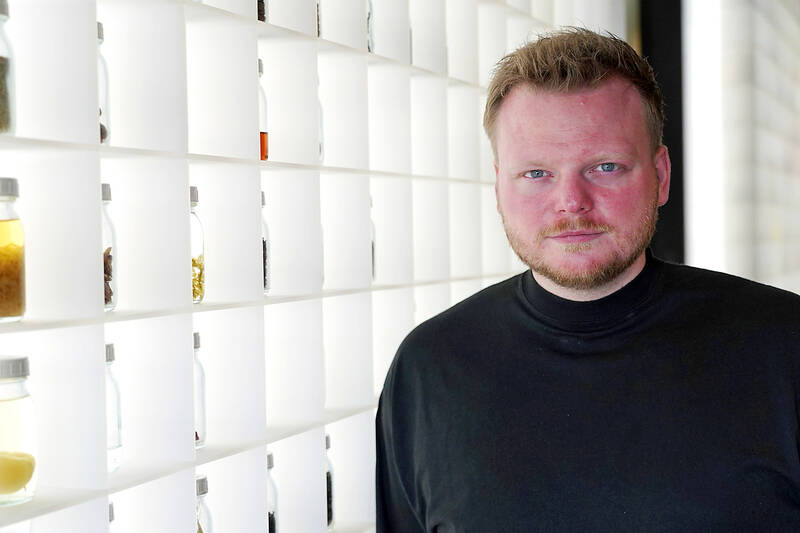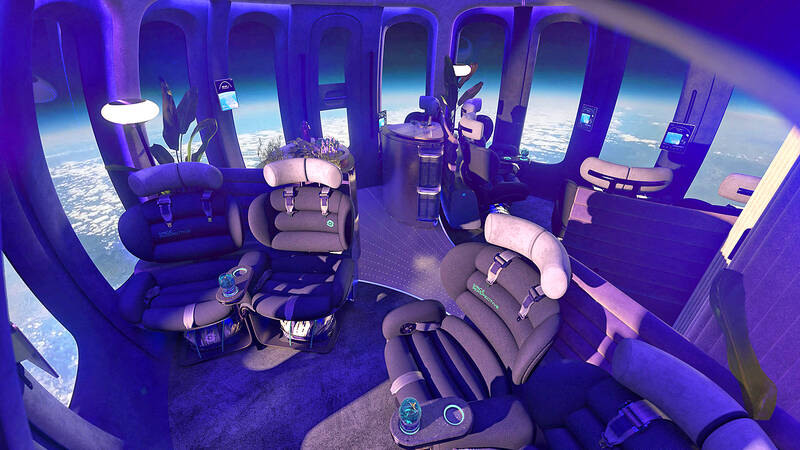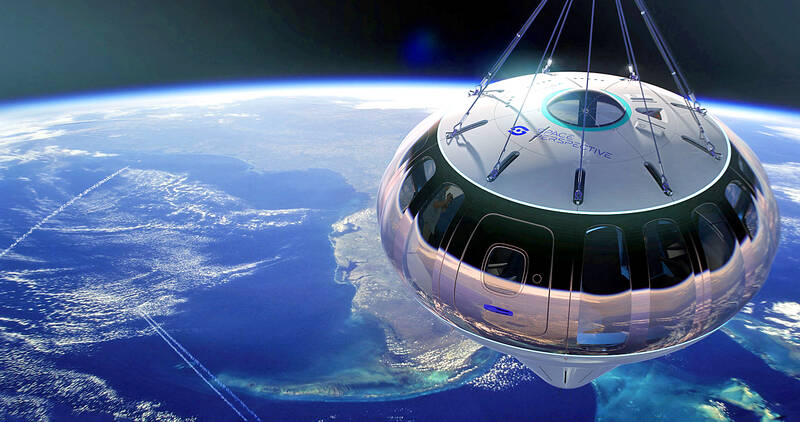Ever since humans have journeyed to space, their meals there have proved to be, well, nothing to write home about.
That could change after a Michelin-starred chef teamed up with the Florida-based start-up Space Perspective to take fine-dining to the upper atmosphere late next year.
Six guests are set to ascend aboard Spaceship Neptune to the stratosphere, where they would enjoy an immersive dining experience served up by Danish Michelin-starred chef Rasmus Munk.

Photo: AP
Munk, 33, would travel with the guests in the capsule and serve the meal himself, from a small kitchen.
He said his menu would be inspired by the impact of space innovation.
“We want to tell stories through the food,” Munk said. “We … want to talk and highlight some of the research that’s been done through the last 60 years.”

Photo: AFP / Space Perspective
“I think that will make an even stronger impact when you’re up there and looking down,” he said.
Spaceship Neptune is more of a balloon than a rocket. The company says its pressurized capsule, attached to a balloon, would lift to an altitude of about 30,480m above sea level where guests would dine while watching the sun rise over the curvature of the Earth.
Organizers are promising an out-of-this-world experience for those with an appetite for adventure, but such an astronomic menu comes with a fittingly astronomic price tag — US$495,000 per ticket.

Photo: AFP / Space Perspective
They say the trip is to last six hours and that they are still in discussion with potential participants.
It is one of the latest offerings by private firms that include Blue Origin Enterprises LP, Virgin Galactic Holdings Inc and Space Exploration Technologies Corp.
The flight would not technically reach “space.” Spaceship Neptune would ascend to about 30km, well below the Karman line, the boundary separating Earth’s atmosphere and outer space, which is about 100km from Earth.
Munk’s menu is expected to be a far cry from meals eaten by astronauts.
The first man in space, Soviet cosmonaut Yuri Gagarin, squeezed beef and liver paste into his mouth from an aluminum tube.
To save on weight, astronauts aboard the International Space Station (ISS) usually dine on dishes packaged in rehydratable containers, including soups and casseroles.
There have been some exceptions. In 2006, French master chef Alain Ducasse created special gourmet food that could be used for celebratory meals aboard the ISS. The tinned dishes included typical Mediterranean ingredients, such as olives, tomatoes, quails and swordfish.
Although Munk is mysterious about his menu, he said he is planning to incorporate glow-in-dark stars made from aerogel and jellyfish protein.
“We are also working on an edible piece of space junk from a satellite,” he said.
“And then, we want to talk about some of the things going on on the planet ... from deforestation to temperatures rising and the garbage in our seas,” he added.
Munk’s Alchemist restaurant in Copenhagen has held two Michelin stars since 2020, and last year was ranked fifth-best restaurant in the world.
Guests dine on a menu of 50 edible “impressions,” and the experience is accompanied by performers and installations, all set in the restaurant’s own architecture — a former theater set building workshop in Copenhagen.
At the restaurant’s center is a large planetarium dome, where guests eat surrounded by projections of Earth seen from space, oceans, forests and even a beating heart.
“I think fine dining, in general, is changing a lot,” Munk said. “And I think you, as a guest, require more an experience in the future.”
Danish food and wine writer Rasmus Palsgaard said gastronomy is becoming more about the experience, and less about what is on the plate.
“More wealthy people or big companies have a desire to really create something special that is more than a meal,” he said. “It’s about much more than just the food being served in front of you.”

Greek tourism student Katerina quit within a month of starting work at a five-star hotel in Halkidiki, one of the country’s top destinations, because she said conditions were so dire. Beyond the bad pay, the 22-year-old said that her working and living conditions were “miserable and unacceptable.” Millions holiday in Greece every year, but its vital tourism industry is finding it harder and harder to recruit Greeks to look after them. “I was asked to work in any department of the hotel where there was a need, from service to cleaning,” said Katerina, a tourism and marketing student, who would

i Gasoline and diesel prices at fuel stations are this week to rise NT$0.1 per liter, as tensions in the Middle East pushed crude oil prices higher last week, CPC Corp, Taiwan (台灣中油) and Formosa Petrochemical Corp (台塑石化) said yesterday. International crude oil prices last week rose for the third consecutive week due to an escalating conflict between Israel and Iran, as the market is concerned that the situation in the Middle East might affect crude oil supply, CPC and Formosa said in separate statements. Front-month Brent crude oil futures — the international oil benchmark — rose 3.75 percent to settle at US$77.01

Merida Industry Co (美利達) has seen signs of recovery in the US and European markets this year, as customers are gradually depleting their inventories, the bicycle maker told shareholders yesterday. Given robust growth in new orders at its Taiwanese factory, coupled with its subsidiaries’ improving performance, Merida said it remains confident about the bicycle market’s prospects and expects steady growth in its core business this year. CAUTION ON CHINA However, the company must handle the Chinese market with great caution, as sales of road bikes there have declined significantly, affecting its revenue and profitability, Merida said in a statement, adding that it would

UNCERTAINTIES: The world’s biggest chip packager and tester is closely monitoring the US’ tariff policy before making any capacity adjustments, a company official said ASE Technology Holding Inc (日月光投控), the world’s biggest chip packager and tester, yesterday said it is cautiously evaluating new advanced packaging capacity expansion in the US in response to customers’ requests amid uncertainties about the US’ tariff policy. Compared with its semiconductor peers, ASE has been relatively prudent about building new capacity in the US. However, the company is adjusting its global manufacturing footprint expansion after US President Donald Trump announced “reciprocal” tariffs in April, and new import duties targeting semiconductors and other items that are vital to national security. ASE subsidiary Siliconware Precision Industries Co (SPIL, 矽品精密) is participating in Nvidia